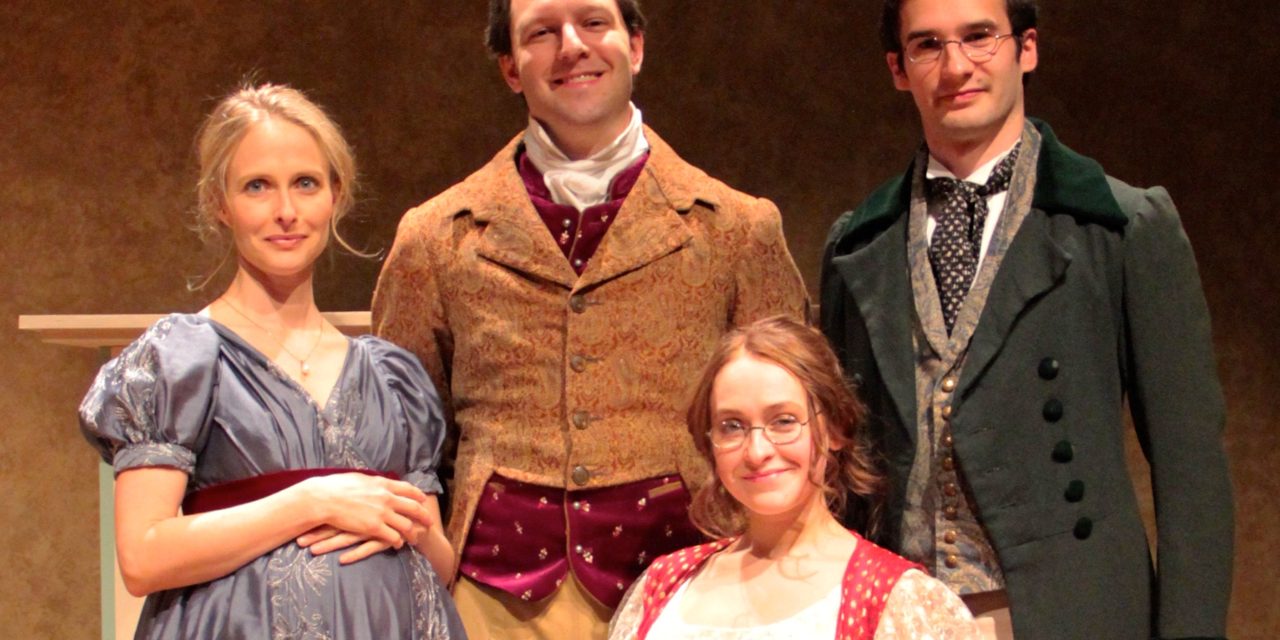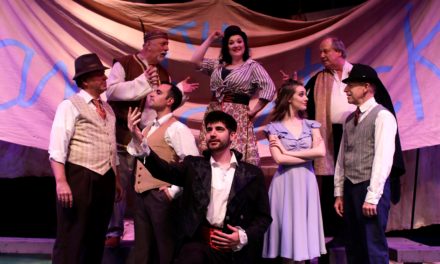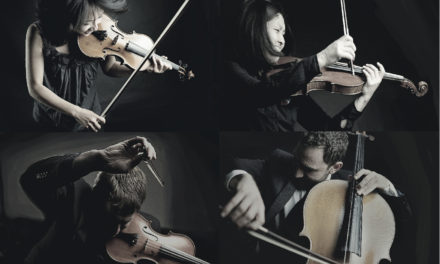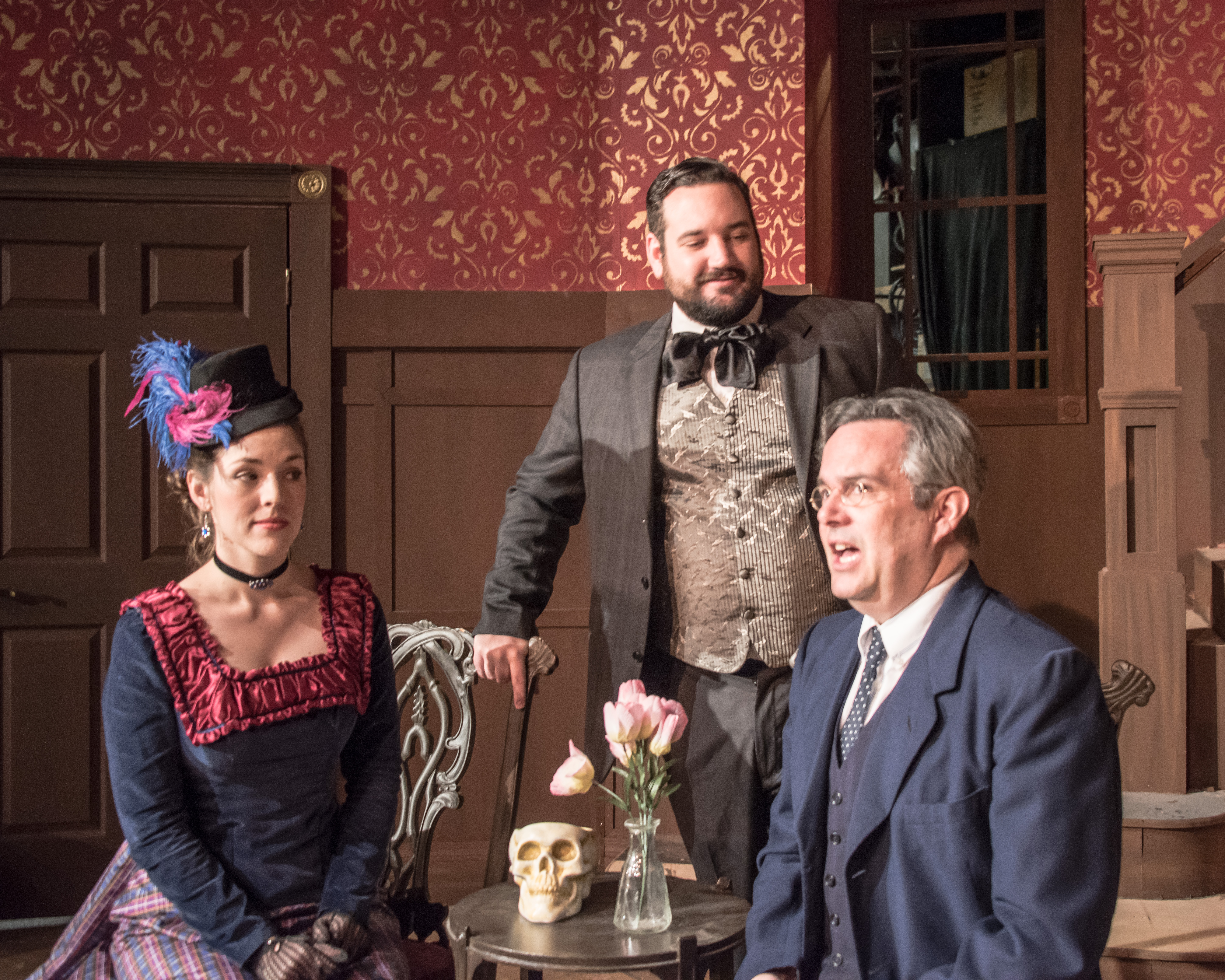(Above: Featured actors in OCT’s holiday production include, left to right, Erica Towe, Matthew Holland, Sabrina Gross, and Joseph Workman)
“Yet this, however, remember: if to PRIDE and PREJUDICE you owe your miseries, so wonderfully is good and evil balanced, that to PRIDE and PREJUDICE you will also owe their termination.” -Fanny Burney, Cecilia (1782, the likely inspiration for Jane Austen’s title.)
By Kelly Oristano
Plays and novels, playwrights and novelists love to say, allow us to explore the entire world from the relative comfort of a padded chair. Jane Austen’s novels dissect and diagnose the mores of an entire society by portraying little but drawing rooms and conversations. Lauren Gunderson’s plays explore the entirety of “the history we tell ourselves” through the distinct lens of the sardonic, self-aware right now.
In Gunderson and Margot Melcon’s Miss Bennet: Christmas at Pemberley, now playing at the Oregon Contemporary Theatre, director Elizabeth Helman has found in the nexus of Austen and Gunderson a lovely alchemy that will warm and brighten the holiday. Miss Bennet, in this iteration, is Mary Bennet, the middle of the five Bennet sisters from Pride and Prejudice; the bookish, introverted, self-aware and thoughtful one. The events of the novel are a couple of years behind us; Lizzie has her Darcy and Jane her Bingley; love has won out, and the older sisters’ lives are largely as they had always hoped they would be.
But Mary, until recently quite happy to have the Bennet estate to herself for the first time ever, is only beginning to think about how she hopes her life might be when all the Bennets, Darcys, Bingleys, and DeBourghs (well, eight of them), are called to convene at Pemberley for Christmas. Liz has imported a new German holiday tradition of bringing a stately evergreen into the house and decorating it as the yuletide approaches, which the other pre-Victorians find simply ghastly.
It is a disservice to the production to delineate the whole plot here, but Mary is surprised early on to meet a bookish, introverted, self-aware and thoughtful young man in Arthur DeBourgh. Though Lydia Wickham, née Bennet, the brash and frivolous younger Bennet sister, and Anne (daughter of Catherine) DeBourgh will swirl around this match and try to scuttle it, “so wonderfully balanced” is this world that Mary and Arthur will push past comical distraction. “I’ve always detested farce,” Mary says as she refuses to let a mix-up about a letter’s author and its intended recipient dictate the course of Act One.
Through the evening, glances, pleasantries, cartographic investigations, letters, sighs, and even a little hot hand-holding action will bind Mary and Arthur.
The ensemble is excellent without exception and very funny to boot. Melanie Moser and Erica Towe are endearing as Lizzie and Jane, the older sisters. Past their own personal dramas and into the “stable” part of their lives, they are of course instantly interested in insinuating themselves into Mary’s quest to live the largest life she can. “I rather like Mary,” Lizzie of her growing sister. “Terrible to admit that I do.
Sabrina Gross is a subtle, smart Mary. Clearly Gunderson and Melcon’s stand-in, her quick-witted diagnoses of the other characters’ flawed reasoning or flawed personalities amount to a hilarious contemporary critical reaction to Austen’s work. She plays the love story smartly, too. Mary overcome with feelings is a Mary who gets quieter than usual, becomes more scientific in her self examination. The throughline of Mary and Arthur’s love story pays off brilliantly at the end on the strength of Gross’s considerate characterization.
The three men take a back seat to the ladies in Gunderson’s world, but the performances are lovely. There is one wonderful scene for just the three of them wherein Darcy and Bingley tenderly help Arthur convince himself that his “concern” for Mary is in fact “what most people call ‘love’.”
Andrew Beck is vocally and physically as perfectly Darcy as you could wish for a Darcy to be; his own happy ending assured, the continuing story is something he keeps perhaps half an eye on, among several other gentlemanly pursuits.
Matt Holland is very funny as Bingley, a ponce among ponces, yet his warmth and romantic spirit are the very heart of the play.
Joseph Workman is especially good as Arthur. It’s a hard tightrope to walk: Mary tells Arthur his fortune makes him unusually free, but Arthur sees it as a shackle, binding him to obligation and traditions he’d hoped to avoid. The dissonance between these two ways of seeing him provides much of the energy that drives the story forward and Workman displays this expertly.
And in a mark of the thoroughgoing professionalism of this production, the two later-arriving supporting performances are among the very strongest in the show. Janelle Rae is funny and touching as a keenly observed and musically voiced Lydia. And Lindsey Esch is asphyxiatingly funny as the grieving misfit Anne DeBourgh, who would have one believe that she is the only person doing things properly and the other seven characters in the play are the misfits.
The production elements also are excellent without exception and complement each other in a unique display of collaborative craftspersonship.
Jeanette DeJong’s costumes are gorgeous and subtly color code the sisters. Mary’s studious blacks and browns contrast Lydia’s bold orange palette, while Jane wears a lot of the pink of spring and new life and Lizzie wears blue and bronze and green which seem to echo Pemberley itself: a beautiful, bright, and fun multi-leveled drawing room/library space designed by Amy Dunn.
Whenever letters are written, they are both spoken by the actors and projected on the walls or floor of the set in character handwriting, the words magically appearing as the characters intone them. There are a couple tender “time passes” montages accomplished with light and music and projection and mime that helped define the emotional space of the story. The attention to detail from every collaborator in the production, from the director to the wig wrangler to the dialect coach, is a laudable achievement.
And though the play mightn’t change your life, it absolutely will make your day. Miseries will indeed be terminated.
Miss Bennet: Christmas at Pemberley continues at OCT
When: Evening shows at 7:30 p.m. on Dec. 6-8 and 13-16; matinees at 2 p.m. on Dec. 9 and 16
Where: Oregon Contemporary Theatre, 194 W. Broadway, Eugene
Tickets: $20 to $40 (the $40 opening-night cost includes wine, beer, and dessert), and $15 for students for all shows except opening night; tickets available at the OCT box office, 541-465-1506, or online at octheatre.org








